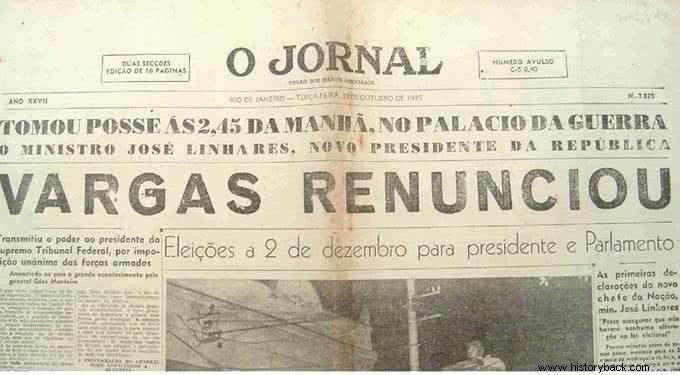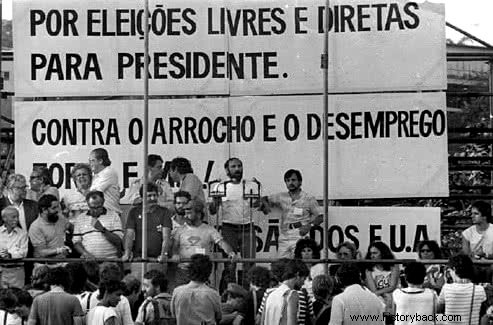It is considered that there was redemocratization of Brazil in two moments of its republican history:
- In 1945 - when Getúlio Vargas was removed from office;
- In 1985 - at the end of the military dictatorship.
Democracy
Before understanding what “redemocratization” is, it is necessary to define democracy.
The word democracy comes from the Greek meaning the government of the people, where sovereignty is in the people.
As it is not possible for an entire population to govern, the people cede their power to political representatives. This is called representative democracy.
In this way, when the people have their fundamental freedoms taken away, they are living under dictatorship. It is important to note that dictatorships can be civil or military.
Thus, “redemocratizing” would mean returning democracy to societies that suffered from dictatorship.
See also:DemocracyNew State (1937-1945)
In 1937, Getúlio Vargas dissolves Congress and grants a new Constitution to the nation. Bans political parties and ends presidential elections.
In addition, it maintains political police and prior censorship in newspapers and shows. This period is known as Estado Novo.
Therefore, it is considered that at this moment there was a democratic interruption in the republican history of Brazil.
See also:Constitution of 1934End of Estado Novo (1945)
In the 1940s, the Estado Novo was no longer unanimous among the Brazilian elite.
One of the documents that reflects this dissatisfaction is the "Manifesto dos Mineiros". Written clandestinely in 1943, intellectuals from the state of Minas Gerais criticize the government. The Manifesto would be published in the press and several of its authors would be arrested.
Another reason was Brazil's participation in World War II. After all, Brazil had gone to fight fascism in Europe and lived under a regime that had dictatorial similarities.
In 1945, Getúlio Vargas suffered a military coup supported by the UDN (National Democratic Union).
Despite having built the image of the “Father of the Poor”, no attempt was made to defend the Getúlio Vargas regime by the population.
 See also:New Status
See also:New Status Redemocratization (1945)
As we have seen, redemocratizing means returning sovereignty to the people and this can only be done through free elections.
As Getúlio Vargas had extinguished the figure of the vice president, who assumed the position was the President of the Federal Supreme Court, José Linhares.
Linhares guaranteed the holding of presidential and parliamentary elections in which several political parties, including the communist ones, could compete. The winner of the election was General Eurico Gaspar Dutra, of the PSD (Social Democratic Party).
Then the second step to redemocratize a society is to change the Constitution.
Thus, the deputies elected to the Congress of Deputies, formed the National Constituent Assembly and promulgated the Constitution in September 1946.
Despite the return of several constitutional guarantees, this process of redemocratization soon proved to be incomplete. The Communist Party was declared illegal in 1947 and the right to vote was forbidden to the illiterate.
See also:Brazilian ConstitutionsMilitary Regime (1964 - 1985)
In 1964, the military, supported by part of Brazilian society, overthrew President João Goulart, in the name of national security.
The military remained in power for 21 years and alternated the presidency of the country among themselves in indirect elections.
In 1967, they established a new Constitution. In it, they suppressed direct voting to the Executive, instituted prior censorship of the media and restricted the right of association.
See also:Military Dictatorship in Brazil (1964-1985)From the Geisel administration to the opening
With the end of the "economic miracle" promoted by the military in the 70s, the population began to show signs of discontent with the military regime. It was also increasingly difficult to hide the torture and disappearance of people persecuted by the regime.
A part of the military realized that their days were numbered and, fearing reprisals, they proposed a “slow, gradual and safe opening”. In this way, civil rights would be gradually restored to the population.
Thus, during the government of Ernesto Geisel (1974-1979), there were timid changes in the political scenario:
- AI-5 has been replaced by constitutional safeguards;
- The death of journalist Vladimir Herzog by the military managed to circumvent the censorship imposed on newspapers and generated protests against the government;
- Brazil has re-established diplomatic relations with communist regime countries such as China, Bulgaria, Hungary and Romania.
In the Figueiredo government (1978-1985) new laws that favor political openness were sanctioned:
- Revocation of AI-5 in December 1978;
- Enactment of the Amnesty Law in August 1979 and the return of political exiles;
- Greater tolerance of popular demonstrations and rallies.
Likewise, deputy Dante de Oliveira proposed direct elections through a Constitutional Amendment. This idea found support in the population that organized the “Diretas-Já” movement, filling the streets of the whole country with demonstrations.
Such proposal, however, would be defeated and the first civil representative, after the military dictatorship, was chosen indirectly, in the Electoral College.
 See also:Direct Now
See also:Direct Now Redemocratization (1985)
The elected president, Tancredo Neves, becomes seriously ill and his vice president, José Sarney, takes office on an interim basis.
After Tancredo's death, Sarney assumes the presidency. The next step would be to hold parliamentary elections to form the National Constituent Assembly. This enacted the new democratic Magna Carta in 1988.
However, Sarney retained the National Intelligence Service and fulfilled his promise not to prosecute anyone involved in torture and financial embezzlement.
The first free and direct presidential elections in Brazil took place in 1989 when Fernando Collor de Mello, from the PRN (National Reconstruction Party), was elected.
Shaken by cases of corruption and illegal financing of his electoral campaign, Collor de Mello resigned from the presidency in 1991 to avoid the impeachment process. .
Democratically elected governments followed from 1994 to 2016 when Brazilian democracy suffered a new setback with the removal of President Dilma Rousseff.
See also:Impeachment of Dilma RousseffWant to know more? Continue here :
- Questions about the military dictatorship
- Military Intervention
- Democracy in Brazil
- What is dictatorship?
